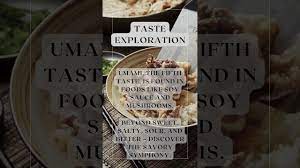The Art of Taste Exploration: A Journey Through Flavors
Embark on a culinary voyage unlike any other as we delve into the enchanting realm of taste exploration. The world of flavors is vast and diverse, offering a myriad of sensations waiting to be discovered and savored.
At the heart of taste exploration lies curiosity and an open mind. It’s about breaking free from the familiar and venturing into uncharted gastronomic territories. Whether you’re sampling exotic spices from distant lands or savoring innovative flavor combinations, each bite is an opportunity to expand your palate and broaden your culinary horizons.
Exploring new tastes is not just about indulging the senses; it’s also a journey of self-discovery. Each flavor evokes memories, emotions, and associations that are unique to each individual. By embracing new tastes, we open ourselves up to a world of possibilities and enrich our lives in ways we never thought possible.
From the fiery heat of chili peppers to the delicate sweetness of ripe fruits, every flavor has a story to tell. It’s about paying attention to the nuances, textures, and aromas that dance on your taste buds with each bite. Taste exploration is a sensory experience that engages all facets of our being, inviting us to fully immerse ourselves in the pleasures of food.
So, let go of your inhibitions, set aside your preconceived notions, and embark on a journey of taste exploration. Allow yourself to be surprised, delighted, and inspired by the endless possibilities that await you in the world of flavors. Bon appétit!
9 Delicious Benefits of Taste Exploration: From Expanding Culinary Horizons to Creating Joyful Dining Memories
- Expands your culinary horizons
- Enhances your appreciation for diverse flavors
- Encourages creativity in cooking and food pairing
- Promotes cultural understanding through food exploration
- Stimulates your senses and heightens your dining experience
- Helps you discover new favorite foods and ingredients
- Provides a fun and engaging way to learn about different cuisines
- Boosts your confidence in trying new foods and flavors
- Creates memorable experiences that bring joy and excitement to meal times
Seven Challenges in the Quest for Culinary Adventure: Exploring the Downsides of Taste Exploration
- 1. Risk of Disliking New Flavors
- 2. Potential for Allergic Reactions to Unfamiliar Ingredients
- 3. Cost of Trying Expensive or Gourmet Foods
- 4. Difficulty in Finding Authentic or High-Quality Exotic Ingredients
- 5. Health Concerns Related to Trying Unhealthy or Unbalanced Flavors
- 6. Cultural Sensitivities or Taboos Around Certain Tastes and Ingredients
- 7. Time and Effort Required to Explore and Acquire New Tastes
Expands your culinary horizons
Engaging in taste exploration expands your culinary horizons by introducing you to a diverse array of flavors, ingredients, and cooking techniques from around the world. By venturing beyond familiar tastes and trying new foods, you open yourself up to a rich tapestry of culinary experiences that can inspire creativity in your own kitchen and deepen your appreciation for the art of cooking. Embracing different cuisines and flavor profiles broadens your palate, allowing you to discover new favorites and develop a more nuanced understanding of the intricate interplay of tastes in gastronomy.
Enhances your appreciation for diverse flavors
Engaging in taste exploration elevates your appreciation for diverse flavors by introducing you to a rich tapestry of tastes and sensations. By venturing beyond your culinary comfort zone, you open yourself up to a world of flavors that span the spectrum from sweet and savory to spicy and tangy. Each new taste experience offers a unique perspective on the artistry of food, allowing you to savor the nuances and complexities that make each flavor distinct and memorable. Through taste exploration, you cultivate a deeper understanding and respect for the diversity of flavors that exist, enriching your palate and broadening your culinary horizons.
Encourages creativity in cooking and food pairing
Taste exploration serves as a catalyst for fostering creativity in cooking and food pairing. By venturing beyond the confines of familiar flavors and ingredients, individuals are inspired to experiment with novel combinations, techniques, and presentations in the kitchen. This pro of taste exploration empowers chefs and home cooks alike to push the boundaries of traditional culinary norms, resulting in innovative dishes that tantalize the palate and spark newfound appreciation for the art of gastronomy.
Promotes cultural understanding through food exploration
Taste exploration, with its diverse array of flavors and culinary traditions, serves as a powerful tool for promoting cultural understanding. By delving into different cuisines and food practices from around the world, individuals can gain insight into the rich tapestry of cultures that exist globally. Through food exploration, we not only satisfy our taste buds but also develop a deeper appreciation for the traditions, histories, and values that shape societies. This immersive experience fosters empathy, respect, and connection across cultural boundaries, ultimately bridging gaps and fostering a more inclusive and harmonious world.
Stimulates your senses and heightens your dining experience
Embarking on a journey of taste exploration stimulates your senses and elevates your dining experience to new heights. By immersing yourself in a world of diverse flavors and textures, you awaken dormant taste buds and unlock a symphony of sensations that dance on your palate. Each bite becomes an opportunity to savor the intricate nuances of ingredients, enhancing not only the flavors but also the overall enjoyment of your culinary adventure. Taste exploration transcends mere eating; it becomes a sensory feast that delights the senses and enriches your appreciation for the artistry of food.
Helps you discover new favorite foods and ingredients
Taste exploration opens the door to a world of culinary delights, allowing you to uncover new favorite foods and ingredients that may have been previously undiscovered. By venturing beyond your usual culinary choices and embracing novel flavors, textures, and aromas, you may stumble upon hidden gems that resonate with your palate in unexpected ways. This process of discovery not only expands your gastronomic repertoire but also adds a touch of excitement and freshness to your dining experiences, enriching your relationship with food in delightful ways.
Provides a fun and engaging way to learn about different cuisines
Taste exploration offers a delightful avenue to immerse oneself in various cuisines, providing a fun and engaging platform for culinary education. By venturing into new flavors and dishes from around the world, individuals can expand their knowledge of different cultures and traditions through the universal language of food. It’s a playful and interactive way to learn about diverse cuisines, fostering a deeper appreciation for the rich tapestry of flavors that exist across the globe.
Boosts your confidence in trying new foods and flavors
Engaging in taste exploration can significantly boost your confidence when it comes to trying new foods and flavors. By stepping out of your culinary comfort zone and embracing unfamiliar tastes, you develop a sense of adventurousness and openness to new experiences. As you discover and appreciate a variety of flavors, your confidence grows, empowering you to be more daring in your food choices and more willing to explore the diverse world of cuisine with enthusiasm and curiosity.
Creates memorable experiences that bring joy and excitement to meal times
Taste exploration has the remarkable ability to transform meal times into unforgettable experiences filled with joy and excitement. By venturing beyond familiar flavors and embracing new tastes, we infuse a sense of adventure and discovery into our dining rituals. Each bite becomes a moment to savor, a chance to create lasting memories that evoke happiness and anticipation. Through taste exploration, meal times transcend mere sustenance, becoming vibrant occasions that spark delight and invigorate the senses.
1. Risk of Disliking New Flavors
One potential downside of taste exploration is the risk of encountering new flavors that may not resonate with your palate. The excitement of trying something novel can sometimes lead to disappointment if the taste does not align with your preferences. This risk of disliking new flavors can deter individuals from venturing beyond their culinary comfort zones, potentially limiting their exposure to diverse and enriching gastronomic experiences.
2. Potential for Allergic Reactions to Unfamiliar Ingredients
One potential downside of taste exploration is the risk of allergic reactions to unfamiliar ingredients. When venturing into new culinary territories, individuals may encounter ingredients they have never consumed before, increasing the likelihood of triggering allergic responses. This can pose a significant challenge for those with food allergies, as the lack of familiarity with certain components may lead to unexpected and potentially dangerous reactions. It is essential for individuals engaging in taste exploration to exercise caution, conduct thorough ingredient research, and consult with healthcare professionals to mitigate the risk of allergic episodes when trying new flavors.
3. Cost of Trying Expensive or Gourmet Foods
One downside of taste exploration is the cost associated with trying expensive or gourmet foods. Delving into the world of premium ingredients and exclusive culinary experiences can put a strain on one’s budget. The allure of indulging in luxurious delicacies may come at a hefty price, making it challenging for some individuals to fully immerse themselves in the realm of gourmet taste exploration. However, with careful planning and moderation, one can still savor exquisite flavors without breaking the bank, ensuring that the joy of taste exploration remains accessible to all who seek it.
4. Difficulty in Finding Authentic or High-Quality Exotic Ingredients
One challenge that can arise during taste exploration is the difficulty in sourcing authentic or high-quality exotic ingredients. When venturing into uncharted culinary territories, finding ingredients that are true to their origins and of premium quality can be a daunting task. The quest for authenticity may involve extensive research, specialized suppliers, and sometimes even traveling to remote regions to procure the desired flavors. Despite this hurdle, the pursuit of genuine and top-notch exotic ingredients adds an element of excitement and authenticity to the taste exploration journey, making each culinary discovery all the more rewarding.
5. Health Concerns Related to Trying Unhealthy or Unbalanced Flavors
One significant con of taste exploration is the potential health concerns associated with trying unhealthy or unbalanced flavors. While indulging in new and exciting tastes can be a thrilling experience, it’s essential to be mindful of the nutritional implications of what we consume. Experimenting with overly sugary, fatty, or processed foods may lead to adverse health effects such as weight gain, nutrient deficiencies, and increased risk of chronic diseases. It’s crucial to strike a balance between indulging in flavorful treats and maintaining a healthy diet to ensure overall well-being and longevity.
6. Cultural Sensitivities or Taboos Around Certain Tastes and Ingredients
One potential drawback of taste exploration is navigating cultural sensitivities or taboos surrounding certain tastes and ingredients. What may be considered a delicacy in one culture could be deemed offensive or inappropriate in another. Respect for diverse culinary traditions and understanding the significance of specific tastes and ingredients within different cultural contexts is essential when embarking on a journey of taste exploration. It requires sensitivity and awareness to avoid unintentionally causing offense or discomfort while exploring new flavors and culinary experiences.
7. Time and Effort Required to Explore and Acquire New Tastes
One notable drawback of taste exploration is the significant time and effort required to delve into and acquire new tastes. Discovering unfamiliar flavors often demands patience, research, and a willingness to step out of one’s culinary comfort zone. From sourcing unique ingredients to experimenting with different cooking techniques, the process of expanding one’s palate can be time-consuming and labor-intensive. Additionally, acquiring a taste for certain unfamiliar flavors may necessitate multiple attempts before developing a genuine appreciation. The dedication and persistence needed for taste exploration can pose a challenge for individuals with busy schedules or limited resources, making it a barrier for some to fully engage in this enriching culinary journey.




